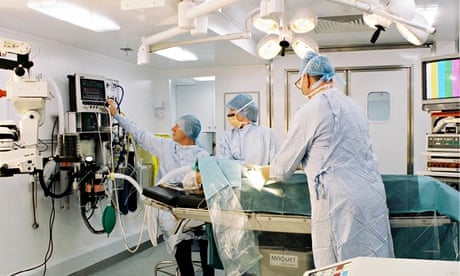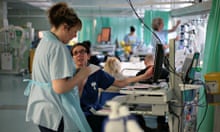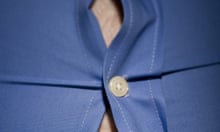A few weeks ago my mum was admitted to hospital with a life-threatening pneumonia, induced by an immuno-suppressive medication she was taking for her rheumatoid arthritis. When the chest x-ray revealed infection in both lungs my father and I, both doctors, understood that her condition was serious. But we also knew that if anyone could fight this, it was one of the toughest and inspirational individuals, a woman who 10 years ago survived a brain haemorrhage.
But after several days into her stay, once the markers in her blood and oxygen levels started to improve, I was particularly concerned when she became uncharacteristically negative and tearful saying: "Just let me go. I've suffered enough." Several days of eating unpalatable hospital food and sleeping poorly had started to have an adverse effect on her physical and psychological condition. Despite starting to recover from the acute cause of her admission she was now being put at risk of an affliction that affects thousands of hospitalised patients daily.
Writing in the New England Journal of Medicine last year, Dr Harlan Krumholz, professor of medicine at Yale, described a syndrome that starts to develop close to discharge from hospital. Physiological systems are impaired, reserves are depleted, and the body cannot effectively mitigate health threats. It is instructive to note that this syndrome – created by the stressful hospital environment – is a significant contributor to hospital re-admissions. It is estimated that 10-20% of patients discharged from hospital in the UK and US will be re-admitted within 30 days, often with a condition entirely unrelated to their original admission.
Poor sleep and inadequate nutrition have an adverse effect on physical performance and co-ordination, cognitive function, immunity, and even cardiac risk. The elderly are particularly vulnerable to being re-admitted with falls and infection, with one study revealing that a fifth of hospitalised patients over 65 had an average nutrient intake of less than 50% of their daily requirements.
Within days of feeding my mum home-cooked food, which we'd brought in, and asking the nurse to not wake her up in the night for unnecessary "routine" blood pressure checks, insisting that she didn't need to be jagged with a needle for blood every day and getting her to wear her own clothes, my mum was smiling again and was able to regain enough strength to be discharged a week later.
A culture of over-investigation and over-treatment is now one of the greatest threats to western health. In the US it is estimated that a third of all healthcare activity brings no benefit to patients. Examples include excessive use of antibiotics, imaging for non-sinister headaches, use of surgery when watchful waiting is better and unwanted intensive care for patients at the end of life who would prefer hospice and home care. In the US, a fee-for-service model encourages high volume and expensive procedures. But we should be alert to similar possibilities here: the UK's "payment by results" – which in reality is a payment-by-activity model – potentially incentivises "doing more" on the part of physicians.
As a profession we have also been guilty – unwittingly or otherwise – of exaggerating the benefits of medications often perceived as magic pills by patients when their benefits are often modest at best. This also detracts from more meaningful lifestyle interventions by giving the public the illusion of protection. One recent study revealed that those taking statins consumed considerably more food and ended up heavier after several years compared to those not taking statins. Our over-obsession with cholesterol-lowering by any means has become "the end in itself" says Rita Redberg, professor of cardiology at the University of California San Francisco: "Who cares about cholesterol lowering if it doesn't benefit the patient?"
Even respected medical guideline panels appear to be influenced by corporate interests. The National Institute of Clinical Excellence has, in successive weeks, issued statements expanding the offer of weight-loss surgery to up to a million more obese patients with type 2 diabetes and suggested statins could be given to millions of healthy people.
At best, this is a contribution to over-medicalisation; at worst, this can seem like the behaviour of a sort of lobby group for the device and pharmaceutical industry. (On Friday Nice's director of clinical practice, Mark Baker, said that allegations that eight of the 12 members of the guideline panel on statins had direct financial ties to the industry were unjustified.)
Political interference often worsens the situation. Jeremy Hunt's recent criticism tainting all GPs for not referring patients early enough for cancer diagnosis is totally unjustified, fuelling more defensive medicine through encouraging over-investigation. This is the worst kind of medicine and goes against what I remember being taught in medical school – which was to treat patients according to clinical need.
But there's a solution. In an effort to curb the unsustainable healthcare costs, estimated to reach a staggering $4.6trn by 2020, a campaign known as Choosing Wisely is gaining momentum in the US. Part of the campaign involves communicating with patients that more expensive medicine doesn't necessarily mean better medicine. And this is reflected by the evidence that four fifths of new drugs are later found to be copies of old ones – not surprising perhaps when pharmaceutical companies spend twice as much on marketing new medications as on research.
We need a more informed decision-making process that gives greater empowerment to patients. Encouraging patients to ask specific questions will also help them understand that sometimes doing nothing is the best approach. Questions such as: do I really need this test or procedure? What are the risks? Are there simpler safer options? What happens if I do nothing? And even how much does it cost? The Academy Of Medical Royal Colleges – led by Professor Terence Stephenson – will report by the end of the year, its recommendations building on this theme. We may discover billions of NHS money that does not add value to patient care.
Reflecting on my mum's care and how she should have been treated from the moment she entered hospital, I'm reminded of the words from the visionary American physician and social activist Hunter Adams: "When you treat a disease, sometimes you win and sometimes you lose. But I guarantee you, when you treat a person, whatever the outcome, you always win." It's time for real "whole person" care.
Aseem Malhotra is a cardiologist and consultant clinical associate to the Academy of Royal Medical Colleges







